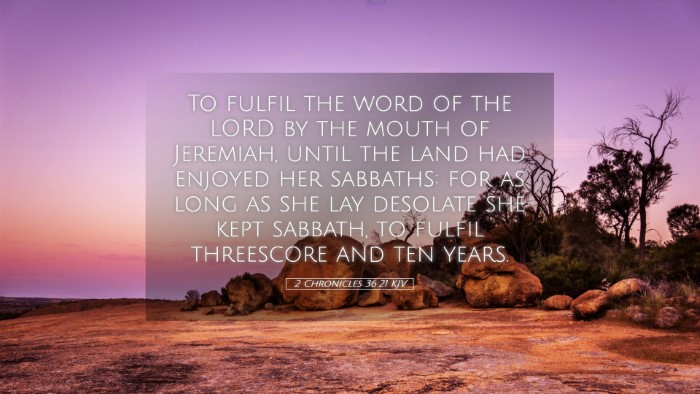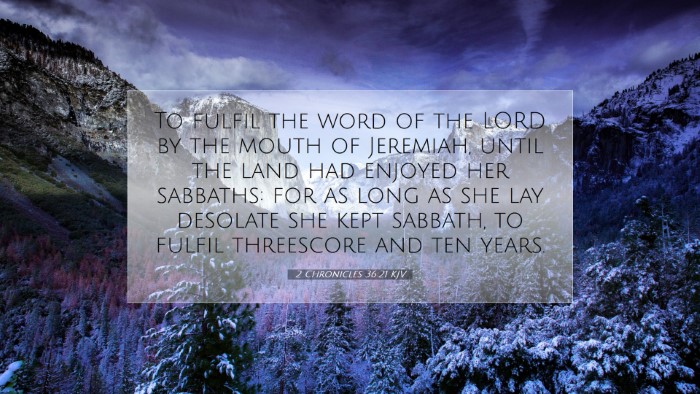Commentary on 2 Chronicles 36:21
Verse Reference: 2 Chronicles 36:21 - "To fulfill the word of the Lord by the mouth of Jeremiah, until the land had enjoyed her sabbaths: for as long as she lay desolate she kept sabbath, to fulfill threescore and ten years."
Introduction
This verse serves as a poignant conclusion to the historical narrative of the kingdom of Judah, highlighting the profound significance of divine prophecy and the fulfillment of God's word through the Babylonian exile. It encapsulates the themes of judgment, restoration, and the adherence to divine laws, particularly concerning the sabbath rest of the land. In this commentary, insights from public domain commentaries, including those of Matthew Henry, Albert Barnes, and Adam Clarke, will be synthesized to provide a deep understanding of this pivotal verse.
Historical Context
Historically, the fall of Jerusalem in 586 B.C. marks a significant moment in the annals of Israel's history. The kingdom of Judah had fallen victim to its persistent idolatry and disobedience to God’s commands, culminating in God's judgment realized through the Babylonian conquest. This verse reflects the prophetic word given to Jeremiah regarding the necessity of the land enjoying the sabbath rest, a command that had been severely neglected by the Israelites.
- Matthew Henry: He emphasizes the importance of understanding the historical context of the Jewish people prior to exile, noting their repeated violations of God's commands, particularly concerning the sabbatical year.
- Albert Barnes: Barnes discusses the covenant relationship expressed between God and His people, asserting that their failure to observe the sabbath years resulted in the desolation of their land, which is a profound warning against neglecting divine commands.
- Adam Clarke: Clarke elaborates further on the notion that the seventy years of captivity were divinely orchestrated, designed not only as judgment but also as a means of restoration and preparation for future blessing.
Meaning of "Fulfill the Word of the Lord"
The affirmation that events fulfilled the "word of the Lord" illustrates a core principle in biblical theology: God’s sovereignty over history. Each prophetic word is not merely a prediction but a proclamation of God’s will that shall certainly come to pass.
- Matthew Henry: He notes that God's purposes will invariably come to fruition regardless of human failure or rebellion. The specifics concerning Jeremiah's prophecy underscore God’s faithfulness to His covenant.
- Albert Barnes: In his observations, Barnes highlights the dual significance of this fulfillment, presenting it as a cautionary tale against flouting God’s precepts and a reminder of the inescapable reality of divine judgment.
- Adam Clarke: Clarke stresses that the preservation of the prophetic word amidst adversity serves as a testament to God’s unyielding justice and mercy. Understanding this aspect is crucial for theological constructs regarding faith and obedience.
The Land and Its Sabbaths
The phrase, "until the land had enjoyed her sabbaths," points towards the theological significance of the sabbatical year and the rest for the land which Israel was commanded to observe. This principle of rest reflects God’s design both for the land and for the people.
- Matthew Henry: In his discourse, Henry elucidates that neglecting the sabbath years degraded both the moral and spiritual fabric of the nation, leading to their ultimate destruction and a commandment that had a wider implications in God’s creation.
- Albert Barnes: Barnes emphasizes the theological implications of the Sabbaths as a restorative practice, indicating that while the land laid desolate, it spiritually and physically healed itself during this purging period of judgment.
- Adam Clarke: According to Clarke, the period of desolation served not only as punishment but also allowed for cosmic order to be re-established—emphasizing the restorative nature of divine judgment.
Conclusion
2 Chronicles 36:21 serves as a culmination of the themes of judgment, restoration, and God's faithfulness to His word. The verse provides insight crucial for pastors, students, and scholars, as it encapsulates the covenantal relationship between God and His people while emphasizing the consequences of disobedience. In understanding this scripture, one grasps the gravity of divine warnings and the hope that lies in God’s promises of restoration even through periods of desolation.
The lessons drawn from this passage continue to resonate, urging modern believers to reflect on the importance of faithfulness to God’s commands and the nature of divine grace that seeks to bring His people back into right standing with Him.


